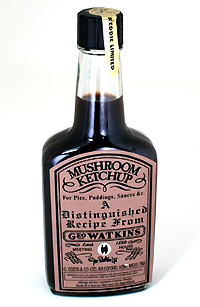
But it may come as a surprise to learn that what we consider a truly American invention is in reality an import. Culinary scholars have confirmed that ketchup's origins can be traced back to imperial China and was originally completely tomato free. The precursor to our modern condiment was a fermented fish sauce created in southern China. Documentation dating back to 300 BC tells a fishy tale of a fermented paste made from fish entrails, meat byproducts and soybeans. In the Chinese Min dialect it was called koe-cheup. It's not difficult to see how the term transliterated into our modern word, ketchup.

The fish sauce was easy to store on long ocean voyages and was carried along Asian trade routes, eventually making its way back to Europe by British sailors. And as it traveled the original recipe became modified to such an extent that by the 19th Century cookbooks featured recipes with ingredients like mussels, mushrooms, walnuts, lemons, celery and even fruits like plums and peaches. They were boiled down into a syrup like consistency or left to sit with salt for an extended period of time. Those processes produced a highly concentrated product which had an intense salty and spicy flavor. One recipe called for 100 oysters, 3 pints of white wine and lemon peels spiked with mace and cloves. The word "ketchup" was at that time used as a generic term to describe any thin dark sauce.
It wasn't until 1812 that the first tomato based ketchup made its debut right here in the City of Brotherly Love. James Mease, a Philadelphia scientist, wrote that the choicest ketchup came from "love apples", the affectionate nickname for tomatoes. Even though many folks in both Europe and America considered tomatoes to be poisonous, they whole heartedly embraced the processed red sauce. And while Jonas Yerkes was the first American to sell ketchup in a glass bottle, it was H. J. Heinz who in 1876 developed the perfect combination of the 5 tastes (salt, sweet, bitter, sour, umami) in his product.
More on the Heinz story tomorrow.
More on the Heinz story tomorrow.
No comments:
Post a Comment